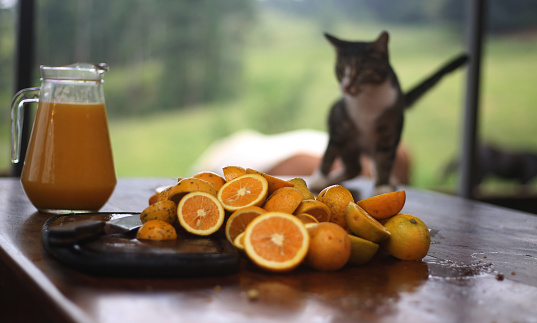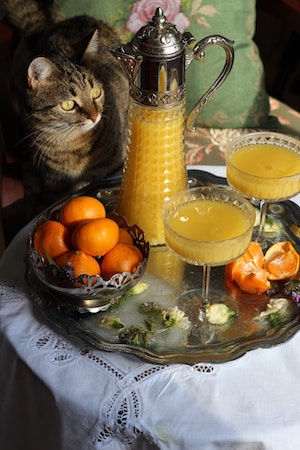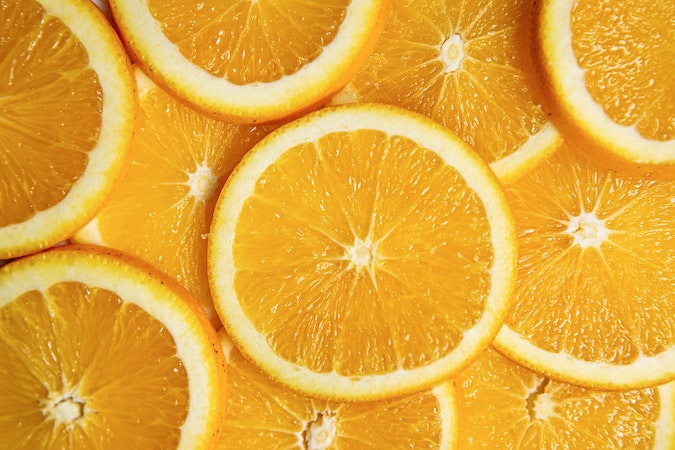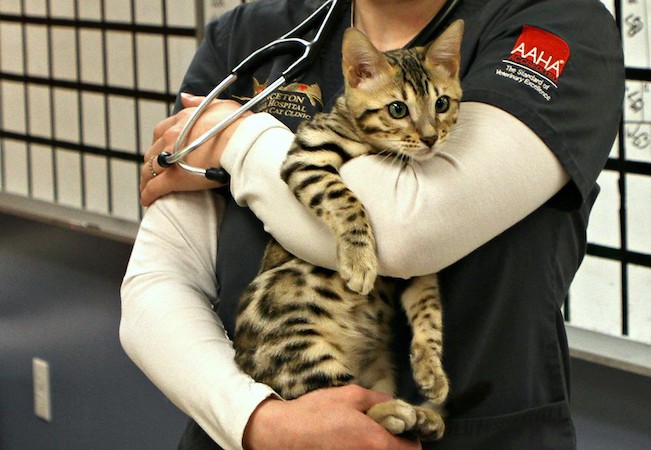Many cat owners like to share their food with their feline friends. And luckily, cats can eat a certain variety of human foods without any problem. However, there are limits to this. Since cats are obligate carnivores, meat is their top preference.
But there are times when cats are intrigued by what their owners are eating. If you are drinking orange juice, your cat might look at you with a pleading face, making you want to share this tasty treat with your kitty cat.
But what if this wholesome human treat turns out to be unwholesome for your furry pal? Can cats drink orange juice?
Let’s find out!

Can Cats Consume Orange Juice?
The quick answer is no; cats cannot drink orange juice. In fact, orange juice comprises citric acid, which can cause stomach upset if ingested by cats. Moreover, orange juice also contains essential oils, which are indigestible by cats. Plus, the high sugar content in orange juice can be problematic for cats.
As I said before, cats are obligate carnivores, and therefore most cats are not interested in orange juice. Likewise, sweet tastes aren’t even appealing to cats.
However, some people have a rather different question. Can cats drink sugar-free orange juice?
Can Cats Drink Sugar-Free Orange Juice?

The answer is no; cats cannot drink sugar-free orange juice. It contains sugar substitutes, which can be even more harmful to felines. In fact, orange juice is orange juice, the citric acid can be highly toxic to cats, causing diarrhea, stomach issues, and vomiting in cats.
For this reason, you should never give sugar-free orange juice to your cat.
Why Is Orange Juice Bad for Cats?
There are many reasons why orange juice is bad for cats. Plus, several constituents in orange juice can be harmful to felines. Since a cat’s digestive system works differently than humans, they aren’t able to enjoy certain human foods, and this includes orange juice.
But why is orange juice bad for cats? Let’s discuss this in a little detail.
Citric Acid: Toxic to Cats
Any foods that contain citric acid are considered bad for cats, and should not be fed to cats. Though citric acid is safe and consumable for humans, it is considered strongly toxic for cats. In fact, even a small dose of citric acid can cause stomach upset and diarrhea in cats.
On the other hand, citric acid in large amounts can be highly dangerous and may result in central nervous system depression. Likewise, if your cat drinks orange juice, it is likely that she will experience citrus poisoning.
High Sugar Content
Orange juices are often packed with high sugar content. Large amounts of sugar can only contribute to health problems and weight gain issues.
Moreover, felines are also susceptible to dental disease, so high sugar can lead to tooth decay quickly. In fact, cats cannot taste sugar, as cats bodies lack enzymes to digest it. Since dental problems are common in cats, feeding anything with high sugar content — including orange juice — cannot be a good idea.

The same can be said for sugar-free orange juice. It contains sugar substitutes, such as xylitol, that can have the same damaging effect on cats as normal sugar.
Psolarens
Citrus products, such as orange juice, are rich sources of psoralens, which is a group of naturally occurring furocoumarins (furanocoumarins).
Similar to how it is seen in humans, psoralens can also make the skin of cats more light-sensitive. Plus, cats are already sensitive to sunlight with their paper-thin skin, then supplying orange juice to their diet makes no sense, as they will only struggle to deal with this more.
Likewise, not only does the compound make skin light-sensitive, but it can also be harmful, as it can cause indigestion and depression in cats.
Essential Oils Are Indigestible
Apart from other constituents, orange juice also contains essential oils that require glucuronyl transferase to metabolize. And unlike humans, felines do not have this in their bodies.

Essential oils such as linalool and limonene can be toxic to cats since their digestive system cannot break down these compounds naturally.
And without the ability to break down such materials, the essential oils will accumulate and reach the point of toxic levels. Likewise, a menthol build-up may also occur, as cats can’t break menthol down either. These essential oils from orange juice can make your cat feel weak, causing diarrhea, vomiting, and drooling.
Cats Don’t Need Vitamin C
Unlike how humans require vitamin C from citrus fruits and vegetables, the bodies of cats can produce their own vitamin C in liver, so they don’t have to depend on their diet. And that is why cats usually never have any vitamin C deficiency problems.
Therefore, vitamin C in orange juice for cats is needless.
Allergies in Cats
Felines have highly sensitive noses and think citrus smells horrible. In fact, some cats are allergic to oranges and may even start showing allergic reactions just by going near an orange peel.
Likewise, cats can also have other problems such as difficulty in breathing, runny nose, and/or eyes. Excessive scratching is one of the most common symptoms of allergies in cats.
And for this reason, people use orange peels as a cat repellent. Orange contains citrus, and it’s one of the most efficient cat deterrents. In fact, cats absolutely hate it.
My Cat Drank Orange Juice, What Should I Do?
Like I said before, orange juice contains citrus, and it has a strong scent. On the other hand, cats have an extremely sensitive sense of smell, making citrus a natural repellent for cats. Since they have sensitive noses, there is a good chance that the cats won’t even go near orange or orange juice.
However, if your cat somehow consumed a little bit of orange juice, you don’t have to panic. The best thing you can do is observe your cat for some time. Watch your feline for 24 hours and see if she exhibits any symptoms like diarrhea, vomiting, drooling, or even excessive scratching.

While some cats may not show any symptoms, but some may experience citrus poisoning. If you think your cat is showing such symptoms, then you should contact your vet immediately. Try to elucidate the situation, so that your vet can understand the condition better.
Signs, Diagnosis, & Treatment of Citrus Poisoning in Cats
Citrus poisoning in cats can be fatal, though it is very rare. In case your cat drinks orange juice, she might start exhibiting symptoms of citrus poisoning immediately. However, the severity of the poisoning will depend on the amount of orange juice consumed by the cat.
Here are some of the common symptoms of citrus poisons:
- Vomiting
- Diarrhea
- Drooling
- Weakness
- Depression
- Allergic dermatitis
- Trembling
Apart from stomach upset and weaknesses, symptoms of citrus poisoning in cats may also include signs of depression and trembling. If you see such symptoms after your cat has consumed orange juice, you should take your cat to the vet immediately. Moreover, since there is no specific type of test to identify citrus poisoning, your vet will have to heavily rely on the information you provide him.
Make sure you inform your vet everything about the poisoning signs that you saw, and when they started to appear. Likewise, in some cases, a vet may opt to make use of a thin tube (endoscope) to understand the cat’s stomach cavity. Your vet might also administer activated charcoal, which can help to soak up any remaining toxins in the cat’s stomach.
Most cats usually make full recovery following the treatment for citrus poisoning. Make sure to ask your veterinarian about your cat’s diet after the treatment.
What’s Makes a Better Treat, if Not Orange Juice?
Unfortunately, our feline friends cannot enjoy a glass of orange juice. Well, water is the best liquid that all cats can drink. But apart from that, what else can cats drink? While there are a few things that cats can drink and is safe for them to drink.
Liquids such as bone broth, goat milk, and tuna water are some tasty treats for cats. Since many cats are lactose intolerant, which makes them unable to drink cow’s milk. So, goat’s milk can make a good option.
Conclusion
So, can cats drink orange juice? The straightforward answer is no. Cats cannot drink orange juice since it contains citrus and other harmful constituents, which can cause stomach upset and other health issues.
However, cats have sensitive noses, and they detest the smell of citrus, so it is likely that they won’t drink juice or even go near it in your absence.
But there is a better way you can link orange juice with cats. You can easily make your own DIY cat-deterrent if your cat is wandering off-limit places.
References
- People Foods to Avoid Feeding Your Pets — ASPCA
- Healthy Ways to Treat Your Cat — PetMD
- Feline Health — TICA

